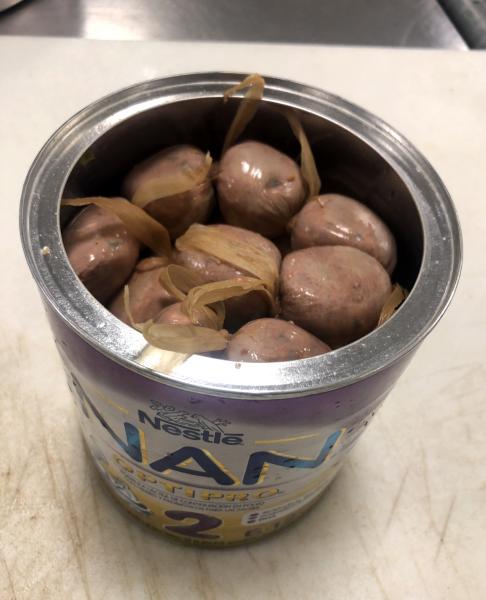STERLING, Va., – Parents of infants cherish the milestone when they can start adding solid food to their baby’s formula diet, but the pork sausages that U.S. Customs and Border Protection (CBP) agriculture specialists discovered concealed inside an El Salvadoran woman’s baby formula is not likely doctor recommended and is most certainly prohibited.

discovered pork sausage links
in baby formula cans.
CBP agriculture canine Beazley alerted to the woman’s baggage after she arrived on a flight recently to Washington Dulles International Airport. During an x-ray examination, CBP agriculture specialists detected anomalies inside two cans of baby formula. After opening the cans, agriculture specialists discovered nearly 4.5 combined pounds of pork sausage.
Swine meat from El Salvador is prohibited from entering the United States due to the presence of swine vesicular disease (SVD), a highly contagious viral disease of pigs caused by an enterovirus. SVD-infected pigs show lesions on the feet, snout and mouth. SVD is costly to eradicate, and it causes severe economic impacts because of export restrictions of pigs and pork products from nations not considered free of SVD. SVD is not found in North America.
“Passengers try various ways to conceal food products that they know to be inadmissible to the United States, such as in this pork concealment attempt, but Customs and Border Protection agriculture specialists and their canine partners are highly trained in detection techniques,” said Casey Durst, CBP’s Director of the Baltimore Field Office. “CBP agriculture specialists and their canine partners continue their vigilance through robust and stringent inspections of arriving passengers and their baggage to search for prohibited products that pose a significant risk to our nation’s agriculture and to our economy.”
CBP agriculture specialists incinerated the pork products and released the woman to continue her visit.

K9 Beazley
International visitors should visit CBP’s Travel section to learn about prohibited and restricted products before they visit.
Read more about swine diseases from the U.S. Department of Agriculture’s Animal and Plant Health Inspection Service.
CBP agriculture specialists perform a critical border security role in safeguarding America’s agricultural and natural resources from harmful pests, and plant and animal diseases. They have extensive training and experience in the biological sciences and agricultural inspection procedures, and they inspect hundreds of thousands of international air passengers, and air and sea cargo nationally being imported to the United States every day.
On a typical day last year, CBP agriculture specialists seized 4,638 prohibited plant, meat, animal byproduct and soil, and intercepted 352 insect pests at U.S. ports of entry.
See what else CBP achieved on a typical day during 2017, or by visiting www.CBP.gov.

